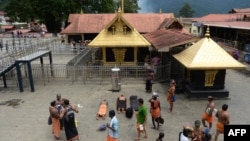The latest window for worship at a flashpoint Indian shrine has closed without a single female devotee of menstruating age being admitted, despite a court order overturning a ban on their presence in the temple.
Mobs of Hindu hardliners prevented women aged 10 to 50 from getting in to the Sabarimala temple complex when it opened last Wednesday for the first time since the Supreme Court reversed a ban on women of menstruating age from worshiping at the temple.
The shrine in southern Kerala state is only open on a handful of auspicious days every year, and a number of Hindu women between these ages had flocked there in the wake of the court order.
But the ruling had enraged traditionalists, including supporters of Prime Minister Narendra Modi's Hindu nationalist Bharatiya Janata Party (BJP).
Protesters, including women and children, massed at the base of the shrine when it opened last week, threatening women trying to reach it.
Some smashed car windows and clashed with police.
Armed police escorted some devotees but none managed to make it to the hilltop temple over the five-day worship period before it closed late Monday. It will not reopen until November.
Sabarimala has become a flashpoint in a battle over gender equality, pitting religious traditionalists against progressive voices pushing for a more liberal Hinduism.
Women are permitted to enter most Hindu temples but are still barred by some.
Those of menstruating age -- between 10 and 50 years -- were denied entry to Sabarimala for decades, reflecting an old but still prevalent view in some parts that connects periods with impurity.
But women have been intensifying campaigns in recent years to be allowed to enter temples and other religious sites.
Two years ago, activists successfully campaigned to end a ban on women entering the Shani Shingnapur temple in Maharashtra state.
Women were also allowed to enter Mumbai's Haji Ali Dargah mausoleum, a Muslim place of worship, after the Supreme Court scrapped a ban in 2016.




